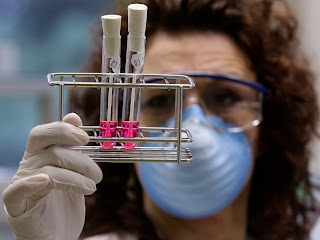Over the past few months, numerous theories have been bandied about regarding the efficacy of certain HIV-centric drugs being potentially effective in treating novel coronavirus (SARS-CoV-2, or COVID-19). Moreover, stories continue to be published claiming that three drugs, in particular – ritonavir, lopinavir, and darunavir – may be used to “cure” COVID-19, a popular, yet untested idea because of the drugs’ effectiveness in treating certain other SARS (Severe Acute Respiratory Syndrome) strains (Journal of the American Medical Association, 2020). Again, these theories are untested.
 |
| Photo Source: Business Insider |
Whenever a new pandemic arises, questions about why existing drugs aren’t being used to treat novel infections arise. Why, after over a century of medical innovations that, before the 19th Century, would’ve been labeled “Witchcraft,” are these pandemics catching us so frequently by surprise? The answer is that each virus is different; each straight of each virus family is different; not every drug that treats one strain of a virus will prove effective in another.
When I was first tasked with writing this piece, my prompt was:
There are lots of stories about coronavirus and the impact on HIV-positive folks. Yet, there are also lots of updates about HIV antiretrovirals being used to treat (and even cure) folks with the virus. So, does it stand to reason an HIV-positive person adherent to their therapy might be more protected?So, I got down to some research. Sadly, the answer I’ve gotten from my own Infectious Disease doctor is:
There’s no real evidence to suggest that those specific HIV medications are 100% effective in treating COVID-19; there’s also no real evidence to suggest that people who are taking those medications and thus have them in their system are any more protected than anyone else.The problem with novel viruses is that they often surface and retreat before any real, definitive testing can be completed. When a new one comes along, scientists rely upon things that have worked in the past to try to cobble together a workable solution in a short amount of time. Moreover, Janssen, maker of darunavir, released a statement on Monday, March 16th stating that there is “…insufficient evidence to suggest that…darunavir can effectively treat COVID-19,” and that “…HIV drugs are being considered as possible treatment options largely due to limited and ‘unpublished virological and clinical data’ that demonstrated they were effective in treating the SARS coronavirus” (Jagielski, 2020).
What is clear is that people living with HIV who have achieved viral suppression through adherence to a treatment regimen are shown to be generally healthier than people with higher levels of the HIV virus detectable in their blood. That doesn’t mean, however, that we are any more or less susceptible to opportunistic infections. Respiratory ailments, in particular, have historically been bad news for people living with HIV.
So, the verdict at this point is: “We don’t know what we don’t know, and therefore, should act with an abundance of caution.”
References:
- Jagielski, D. (2020, March 16). Johnson & Johnson Says There's Insufficient Evidence Its HIV Drug Can Treat COVID-19. Alexandria, VA: The Motley Fool: Investing. Retrieved from: https://www.fool.com/amp/investing/2020/03/16/johnson-johnson-says-theres-insufficient-evidence.aspx
- Young, B. E., Ong, S. W. X., Kalimuddin, S., et al. Epidemiologic Features and Clinical Course of Patients Infected With SARS-CoV-2 in Singapore. JAMA. Published online March 03, 2020. doi:10.1001/jama.2020.3204 Retrieved from: https://jamanetwork.com/journals/jama/fullarticle/2762688

No comments:
Post a Comment